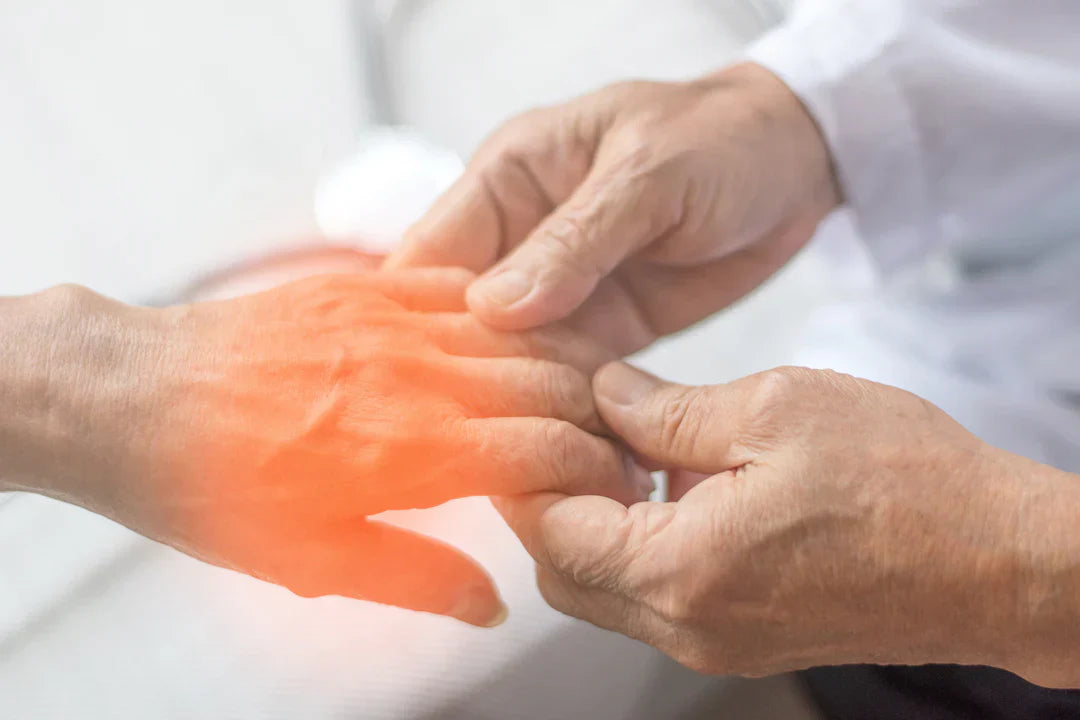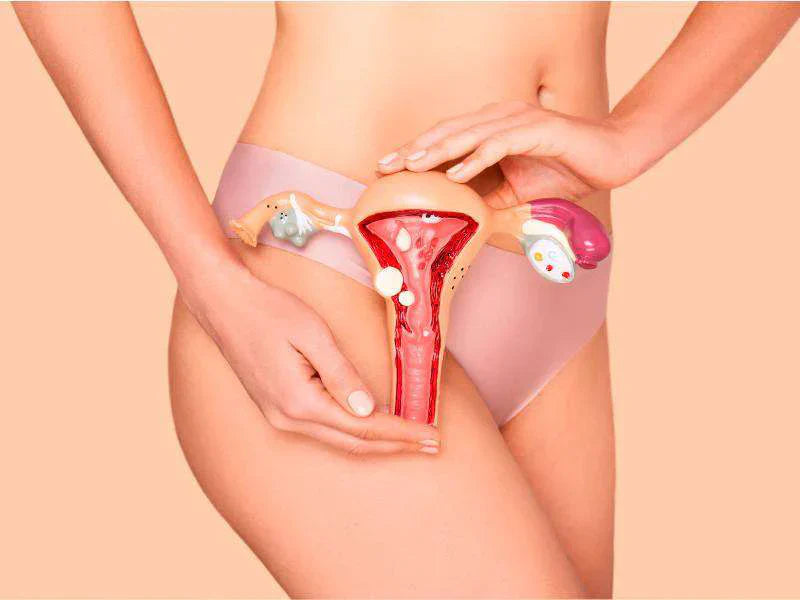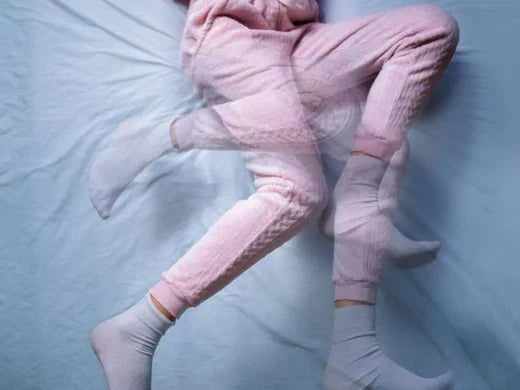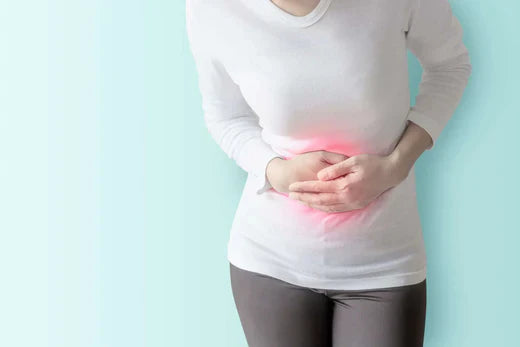Do you feel tingling in your hands and wonder what could be causing it? Here we explain what causes this strange sensation and why it can occur during menopause. We also leave you with some key tips to alleviate the discomfort.
What does the tingling in the hands represent?
Tingling in the hands is medically referred to as "paraesthesia". It is an unusual sensation that people define as multiple pins and needles, walking ants or numb hands. You may have felt something similar when you fall asleep on your arm or when you spend a long time sitting in the same position (1).
Parasthesias can occur anywhere in the body, but we will focus on the hands. The most common causes are (1,2):
- Nerve compression. Also associated with carpal tunnel syndrome.
- Problems with blood circulation
- A trapped nerve in the back or neck.
- Certain medical conditions such as diabetes, multiple sclerosis, and Raynaud's.
- Use of certain medications such as chemotherapy, seizure remedies, or antibiotics.
- Toxic substances, such as lead or radiation.
- Nutritional deficiencies such as low levels of vitamin B12.
- Drinking too much alcohol
- And even menopause.
Hormonal imbalances can lead to direct nerve damage and changes in the tissues which, when inflamed, compress the nerves. During menopause, hormonal changes occur, mainly due to a drop in oestrogen. Oestrogen is an important hormone for nerve function. Oestrogen deficiency can therefore lead to changes in the arteries that make it difficult for blood to circulate to the hands and feet (2,3,4).
In menopause, a tingling sensation may appear in various parts of the body. This is due to alterations in the functioning of the nerves. Other classic symptoms of this stage of life such as hot flushes, hair loss, fatigue, and mood swings also appear. In addition, paresthesias may be more intense in the event of a disease that causes tingling, such as diabetes or nerve damage (2,3,4,5).

Danger signs
While tingling in the hands during menopause may be a benign symptom for many, it is essential to be aware of the danger signs. Seek medical attention if you experienc (2):
- Intense pain.
- Weakness in the hands or arms.
- Dizziness or fainting.
- Any other neurological symptoms such as difficulty speaking, moving arms or walking.
These could be signs of more serious conditions, such as stroke or nerve damage.
How to relieve tingling in the hands?
Preventing tingling in the hands during menopause is not possible, but it can be alleviated. Some practical tips to improve this discomfort are (4,6):
- Eat a diet rich in fruit and vegetables that provide sufficient vitamins and minerals.
- Keep active by exercising regularly to improve blood circulation. Some ideas for physical exercise include dancing, walking, swimming, and cycling.
- Learn and practice stress management techniques such as meditation or deep breathing. Remember that stress can exacerbate menopausal symptoms, including tingling in the hands.
- Limit alcohol and caffeine. Both can affect circulation and nerve health.
- Use vitamin B supplements as recommended by your doctor.
- Try acupuncture to improve some muscle aches and tingling sensations.
Finally, consult a health professional for personalised guidance. For example, hormone replacement therapy or the use of phytoestrogens may help relieve symptoms; or treat any other cause of the paraesthesia.
Tingling in the hands is a little-known symptom of menopause that often causes a lot of anxiety. It usually happens as part of the hormonal change your body undergoes but can be aggravated by other underlying conditions. That's why it's important to understand the causes and warning signs that will help you identify more serious problems.
We invite you to read about restless legs syndrome and how it relates to menopause!
Bibliographical references
- NHS. Pins and needles
2021. Available from: https://www.nhs.uk/conditions/pins-and-needles/
- NIH. Peripheral Neuropathy.
2023 Available from: https://www.ninds.nih.gov/health-information/disorders/peripheral-neuropathy
- Li J, Chongpison Y, Amornvit J, Chaikittisilpa S, Santibenchakul S, Jaisamrarn U. Association of reproductive factors and exogenous hormone use with distal sensory polyneuropathy among postmenopausal women in the United States: results from 1999 to 2004 NHANES. Sci Rep.
2023 13(1):9274. Available from: https://www.ncbi.nlm.nih.gov/pmc/articles/PMC10247787/
- Zhang L, Ruan X, Cui Y, Gu M, Mueck AO. Menopausal Symptoms and Associated Social and Environmental Factors in Midlife Chinese Women. Clin Interv Aging.
2020 15:2195-2208. Available from: https://www.ncbi.nlm.nih.gov/pmc/articles/PMC7678706/
- Sun S, Du R, Wang S, Guo Y, He H, Wang X, Zhang D, Yin W, Li M, Wu Y, Zhang C. Age at menopause was not associated with microvascular complications in patients with type 2 diabetes mellitus. Medicine (Baltimore).
2023 102(26):e34066. Available from: https://www.ncbi.nlm.nih.gov/pmc/articles/PMC10313268/
- NHS. Peripheral Neuropathy.
2022 Available from: https://www.nhs.uk/conditions/peripheral-neuropathy/treatment/
You May Also Like

JOIN US AND GET 10% OFF
Sign up to our newsletter to access free resources, advice and support.















